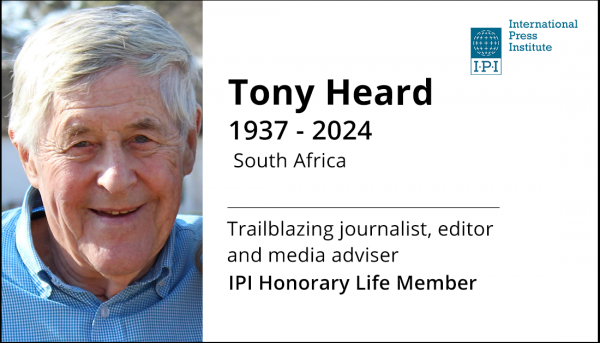The Vienna-based International Press Institute (IPI), a global network of publishers, editors and leading journalists, today sent an open letter to President Jacob Zuma of South Africa, urging him to reject the Protection of State Information Bill if it is not amended to allow a public interest defence plea.
The letter is signed by IPI’s Executive Director Alison Bethel McKenzie; Ferial Haffajee, editor of City Press; Barney Mthombothi, editor of the Financial Mail and Raymond Louw, Chairperson of the South Africa Press Council and publisher of the Southern Africa Report.
The full letter is below:
H.E. President Jacob Zuma
South African Government
Union Buildings,
Government Avenue,
Pretoria.
South Africa.
24 November 2011
Dear President Zuma,
We are writing you today from the International Press Institute (IPI) to ask that you stop the Protection of State Information Bill from becoming law if – by the time it reaches your desk – it does not provide a plea defense for those who leak and report information that is in the public interest.
IPI is a Vienna-based global network of publishers, editors and journalists dedicated to the furtherance and defence of press freedom around the world.
IPI Executive Director Alison Bethel McKenzie wrote to you in August 2010 to express IPI’s concerns over the bill, as well as IPI’s concern over the ANC’s proposed media tribunal.
While some positive changes have been made to the secrecy bill since then, the fact remains that journalists face between five and 25 years in prison for revealing classified information – and no explicit defense is provided for those who do so in the public interest.
As we said before, this law would have a deleterious effect on investigative journalism in South Africa. One of the core duties of journalists is to ensure government accountability, including through the publication of information that may have been deemed secret not because its revelation would threaten national security, but because it reflects poorly on a particular public official or public institution.
Governments come and governments go. What remains is the media’s duty to hold the government of the day accountable for its actions. If journalists must think twice or three times before publishing crucial information because they are afraid that they could receive a prison sentence similar to that of a violent criminal, there will be fewer reports, and in the long term it is the public and the nation that will suffer.
We understand that the Protection of Information Bill must now be passed by the National Council of Provinces. We hope that they will insist on the inclusion of a provision that allows those who report on secret information to plead a public interest defence, which would be determined on a case by case basis by the court in which the journalist is accused of breaching the law. But if they do not, then we hope that you, as President of South Africa, will see to it that this legislation is stopped before it can do any damage to the robust media and democracy that South Africans enjoy today.
Sincerely Yours,
Alison Bethel McKenzie
Executive Director
International Press Institute (IPI)
Ferial Haffajee
Chief Editor
City Press
IPI Board Member
Barney Mthombothi
Editor
Financial Mail
Former IPI Board Member
Raymond Louw
Chairperson, South African Press Council
Publisher & Editor, Southern Africa Report
IPI World Press Freedom Hero


